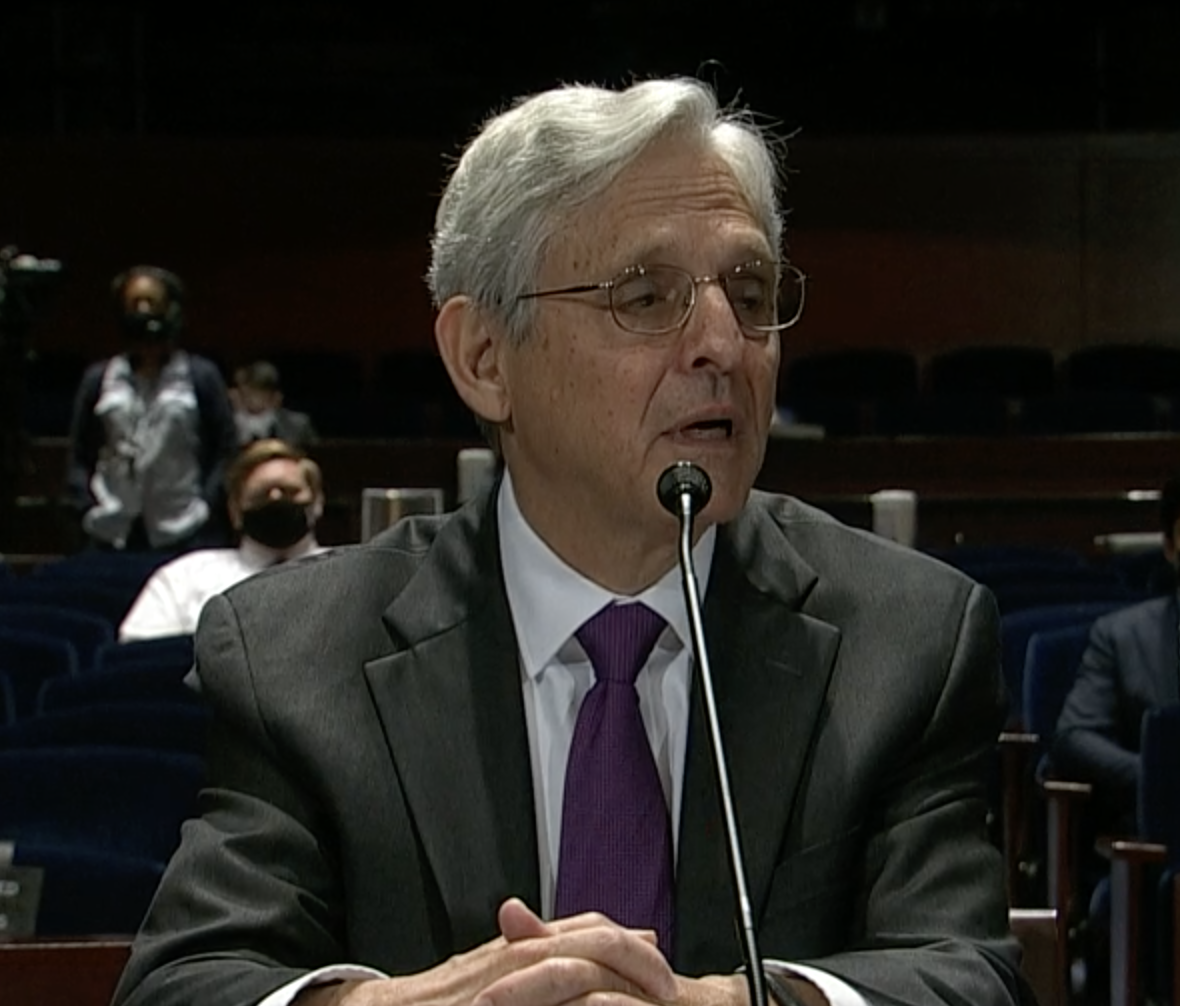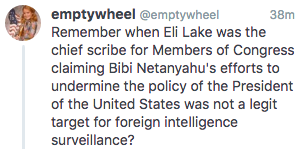James Gordon Meek and Merrick Garland’s “Suspect Exception”
According to a discovery response letter sent on April 7, the government had only been able to access one of four laptops it seized from investigative reporter James Gordon Meek’s house when it searched his home for Child Sexual Abuse Material a year ago.
The government has not been able to access evidence item 1B4 and has not relied on any content from that device in its charges against your client. The laptop referenced in the complaint is evidence item 1B6. That item is and has been available for your review at the FBI facility, and a copy of the data was provided for your visit on March 16.
The government did seize four laptops from Mr. Meek. Those items are labeled 1B3, 1B4, 1B5, and 1B6. At this time, the government has only accessed 1B6.
The letter was made available as part of a motion to compel discovery filed last week.
That detail came in response to a question about why, when Meek’s legal team conducted an evidence review at the FBI on March 16, they were not able to access one of the laptops.
During our evidence review at the FBI on March 16, 2023, we were not able to review the contents of the laptop seized from Mr. Meek (item 1B4). Three of the data volumes appeared to still be encrypted. Our expert asked CART Gabriela Mancini about this issue, and Ms. Mancini explained that the laptop had not been “processed.” We noted that the government stated in the complaint affidavit that the FBI recovered 90 CSAM items from the laptop. It is unclear how this was done without processing the laptop.
[snip]
Furthermore, it is my understanding that the government seized a total of four laptop computers. Can you please confirm that 1B4 is a MacBook laptop, and the status of the other seized laptop computers?
These three still unexploited laptops are of some interest given the questions Meek’s (refreshingly competent, given what I’ve become used to from many of the January 6 lawyers) attorney Eugene Gorkhov raised in the MTC about how DOJ treated Meek as a journalist.
Most of the issues in the MTC are just competent lawyering: demanding more details about how the investigation into Meek moved from a DropBox tip to the National Center for Missing and Exploited Children to the Virginia State Police to the Arlington County Police to the FBI, and asking for evidence that the leaks to the press detailing aspects of the investigation show bias. Those questions are likely fairly easily explained (or blown off). If they’re not, they’ll provide leverage at trial, if not reason to dismiss the case.
It’s how DOJ treats a journalist when investigating him for suspected crimes entirely unrelated to his journalism that is of interest in this MTC.
Gorokhov describes receiving notice that DOJ used a filter team, both in advance of his April 2022 search and — presumably — in advance of investigating materials obtained with a warrant served on a cloud provider, back in November 2021. But DOJ refused to share the filter protocol.
In its search of the electronic devices seized from Mr. Meek’s residence, the government accessed Mr. Meek’s newsgathering materials, including communications, sensitive confidential sources, and work product. The government stated that it employed filter procedures while carrying out these searches. The discovery materials reference filter team memoranda dated November 24, 2021 and April 22, 2022. The defense has requested copies of these memoranda, Ex. 4 at 6, but the government has refused to provide them, claiming that they are work product and that, in any event, Mr. Meek has no reporter’s privilege because no such privilege exists. Ex. 5 at 5. Mr. Meek has also requested documentation relating to requests to, and approvals by, senior DOJ officials19 in connection with the search warrant applications in this case or any other investigative steps in this case. Ex. 4 at 7. The government has refused to produce this material. Ex. 5 at 5.
Gorokhov asks how that’s consistent with its media policy, particularly given the 2021 report on legal process used with journalists. He suggests Meek shows up twice there — first, in a subpoena approved by the Assistant Attorney General served on a media outlet (presumably ABC) to identify who accessed a particular news article, then Deputy Assistant Attorney General approval under a “suspect exception” before obtaining the first warrant targeting Meek.
Mr. Meek has also requested documentation relating to requests to, and approvals by, senior DOJ officials19 in connection with the search warrant applications in this case or any other investigative steps in this case. Ex. 4 at 7. The government has refused to produce this material. Ex. 5 at 5.
The government’s own policies and actions belie its position that Mr. Meek’s newsgathering materials are entitled to no protection. If this were true, then why did the government claim to implement filter procedures? Additionally, why did the FBI agents at the search ask Mr. Meek to identify devices containing newsgathering materials? The DOJ’s own policies reflect the recognition that newsgathering materials are entitled to protection: “The Department recognizes the important national interest in protecting journalists from compelled disclosure of information revealing their sources, sources they need to apprise the American people of the workings of their Government.” 28 C.F.R. § 50.10(a)(2). To be sure, the DOJ’s policies provide more protection in circumstances where newsgathering activities are the subject of investigation, but the need to protect such information is recognized by the DOJ even in instances where the investigation is unrelated to newsgathering activities. See, e.g., 28 C.F.R. § 50.10(d)(2) (requiring authorization of Deputy Assistant Attorney General for the Criminal Division prior to issuing compulsory process to a member of the media for conduct unrelated to newsgathering); 28 C.F.R. § 50.10(o)(4) (“Members of the Department should consult the Justice Manual for guidance regarding the use of filter protocols to protect newsgathering-related materials that are unrelated to the conduct under investigation.”).
19 See Ex. 6, Annual Report: Department of Justice Use of Certain Law Enforcement Tools to Obtain Information from, or Records of, Members of the News Media; and Questioning, Arresting, or Charging Members of the News Media (Year 2021). The publicly available report indicates that in 2021, the Deputy Assistant Attorney General authorized a search warrant for an online account of a journalist in connection with a child exploitation investigation. The same report also states that “the Assistant Attorney General for the Criminal Division authorized the issuance of a grand jury subpoena to a news media entity in order to obtain IP address information for computers that accessed a particular online news article during a specified narrow timeframe.” The government has provided no records reflecting the latter investigative activity by the FBI, and
I highly doubt that Meek will get anywhere with this challenge for the legal reasons DOJ gave in its reply. There’s no reporter’s privilege, especially not in the Fourth Circuit, and especially not when a reporter has committed the offense at issue.
Your client has no reporter’s privilege in any way relevant to this case. The Fourth Circuit— following the Supreme Court—has declined to recognize a privilege for reporters in criminal proceedings even when the reporter is merely a witness to a crime. See United States v. Sterling, 742 F.3d 482 (4th Cir. 2013) (citing Branzburg v. Hayes, 408 U.S. 665 (1972)). There is no basis for the assertion of any such privilege when the reporter has himself committed the criminal offense, and even less so where, as here, the crime is unrelated to his newsgathering activities. That the government voluntarily took steps to shield the case prosecutors from materials related to your client’s newsgathering activities does not create any right or privilege for your client, and there would be no suppression right or remedy available, even supposing that there had been a deviation from the protocols the government elected to impose upon itself. [my emphasis]
But note the reference to “this case.”
As consistent with DOJ’s assurances that they will only rely on one laptop to prove the CSAM case against Meek, the forfeiture language in the indictment applies to just that one laptop.
But given Gorokhov’s language in the MTC, the warrants were written to access everything.
Given that the investigation was purportedly focused on CSAM, which is limited to a “visual depiction” of minors engaged in sexually explicit conduct, it is not clear why the government sought to have law enforcement agents search the entirety of Mr. Meek’s files.
To be fair, FBI searches everything in CSAM cases, not least because of means that sophisticated users use to hide CSAM.
But it’s an especially apt question given that, the day after the search, the FBI discussed suspicions that Meek had classified documents.
The FBI’s internal documents and communications in the wake of the raid, disclosed to defense counsel only after Mr. Meek was charged, revealed that the government planned to investigate its suspicions that Mr. Meek possessed classified documents.
This is a loophole I pointed out when Merrick Garland first rolled his revised media guidelines. The guidelines offered new protections to reporters obtaining classified materials in the course of newgathering — as Meek would have been.
But it also exempted subjects from the guidelines if they were suspected of a non-newsgathering crime. Like CSAM possession. Or, in the case of Julian Assange, the hacking charge with which he was first charged (I believe the Espionage Act is also exempted, and foreign agents are definitely exempted).
This is, I suspect, an error that Rashida Tlaib made in her letter calling on Merrick Garland to drop the charges against Assange. She suggests that dropping the indictment would be in keeping with Garland’s new policy.
As Attorney General, you have rightly championed freedom of the press and the rule of law in the United States and around the world. Just this past October the Justice Department under your leadership made changes to news media policy guidelines that generally prevent federal prosecutors from using subpoenas or other investigative tools against journalists who possess and publish classified information used in news gathering. We are grateful for these pro-press freedom revisions, and feel strongly that dropping the Justice Department’s indictment against Mr. Assange and halting all efforts to extradite him to the U.S. is in line with these new policies.
Ignoring the possibility that DOJ has made a foreign agent determination with Assange — a very real possibility, in his case, in which case the policy doesn’t apply at all — it still seems that the plain language of the policy suggests once you become an investigative subject for a non-newsgathering crime — hacking in the case of Assange, CSAM possession in Meek’s case — then the application of the policy is uncertain.
As DOJ moves towards a June 20 trial date for Meek on CSAM charges, three of his laptops remain, unexploited, at the FBI. DOJ has said he has no reporter’s privilege interest in the CSAM case and that’s absolutely right. But those three laptops, obtained with a warrant approved on that suspect exception, as well as other reporting materials from the devices they did exploit, still remain in FBI’s custody, obtained with a warrant gotten under the suspect exception.
The charges against Meek are very serious and quite disturbing. But that makes his case a very good test of how Garland’s media policy applies with someone who is a suspect in an awful crime, but also, by any measure, an investigative reporter. DOJ seized, and is holding (in potentially encrypted form) materials and devices that relate to his newsgathering which would otherwise be covered by the news media policy. DOJ has kept these materials from the CSAM team. But after his prosecution, what will become of those materials?
Disclosure: In this post I describe my limited acquaintance with Meek going back to the Libby trial, with more recent interactions in 2018 or 2019.
Timeline
March 11, 2021: NCMEC received tip from Dropbox
June 2021: Virginia State Police served subpoenas on Verizon and Google
N.d.: VSP referred case to Arlington County Police Department
September 7, 2021: Referral from ACPD to FBI
November 24, 2021: Filter team memoranda
April 22, 2022: Filter team memoranda
April 27, 2022: Search
April 28, 2022: FBI email chain stating Meek may be in possession of classified information
October 19, 2022: Rolling Stone reported on search; Marjorie Taylor Greene tweet claims to know search was about CSAM
November 2, 2022: Gorokhov raises leaks with AUSAs
December 19, 2022: Rolling Stone reported “indictment” being prepared
January 31, 2023: Arrest affidavit [warning: exceptionally graphic language]
February 1, 2023: At detention hearing, DOJ incorrectly claimed Meek said his “life was over”
February 20, 2023: Consent motion for extension of indictment
February 24, 2023: Meek discovery letter
March 16, 2023: DOJ response, stating that it does not intend to produce filter team memo
March 30, 2023: Indictment
March 31, 2023: Follow-up discovery letter
April 7, 2023: Government response
April 20, 2023: Motion to compel disclosure
April 21, 2023: Judge Claude Hilton granted complex designation, set June 20 trial date







